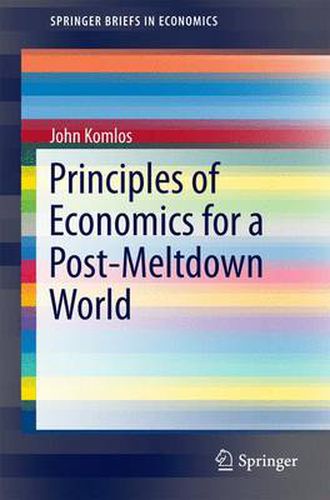Readings Newsletter
Become a Readings Member to make your shopping experience even easier.
Sign in or sign up for free!
You’re not far away from qualifying for FREE standard shipping within Australia
You’ve qualified for FREE standard shipping within Australia
The cart is loading…






This title is printed to order. This book may have been self-published. If so, we cannot guarantee the quality of the content. In the main most books will have gone through the editing process however some may not. We therefore suggest that you be aware of this before ordering this book. If in doubt check either the author or publisher’s details as we are unable to accept any returns unless they are faulty. Please contact us if you have any questions.
This brief emphasizes the ways in which introductory economics textbooks incorrectly rely on assumptions about the free market, the rational agent model, market fundamentalism, and standard long-standing assumptions in economics, and in doing so disregard the effects of incomplete and asymmetric information on choice and on allocation, and maintain a general but flawed belief that competitive markets can always provide efficient solutions automatically. In other words, the standard economics principles textbook is anachronistic, they assume that tastes are exogenous, they overlook interdependencies and externalities not only in production but in consumption of goods, and they overlook the fact that path-dependence is a major hindrance to optimization. Mainstream principles of economics textbooks distort our worldview with immense political and cultural consequences. Students of these principles deserve a more complete perspective, and this brief critiques that conventional worldview and provides an alternative perspective, with an emphasis on free-market economics wherein the human element should be paramount and moral judgments should override market outcomes. In other words, what is important is not GNP as much as the quality of life, not institutions but how people live and fare in them. This brief argues that economics cannot be a science; it has too many ideological aspects, and in many ways conventional textbooks are not providing a true-to-life depiction of the economy. This Brief will be a reference or supplemental text for college and university students enrolled in such applied undergraduate and graduate courses and seminars in economics and economic theory.
$9.00 standard shipping within Australia
FREE standard shipping within Australia for orders over $100.00
Express & International shipping calculated at checkout
This title is printed to order. This book may have been self-published. If so, we cannot guarantee the quality of the content. In the main most books will have gone through the editing process however some may not. We therefore suggest that you be aware of this before ordering this book. If in doubt check either the author or publisher’s details as we are unable to accept any returns unless they are faulty. Please contact us if you have any questions.
This brief emphasizes the ways in which introductory economics textbooks incorrectly rely on assumptions about the free market, the rational agent model, market fundamentalism, and standard long-standing assumptions in economics, and in doing so disregard the effects of incomplete and asymmetric information on choice and on allocation, and maintain a general but flawed belief that competitive markets can always provide efficient solutions automatically. In other words, the standard economics principles textbook is anachronistic, they assume that tastes are exogenous, they overlook interdependencies and externalities not only in production but in consumption of goods, and they overlook the fact that path-dependence is a major hindrance to optimization. Mainstream principles of economics textbooks distort our worldview with immense political and cultural consequences. Students of these principles deserve a more complete perspective, and this brief critiques that conventional worldview and provides an alternative perspective, with an emphasis on free-market economics wherein the human element should be paramount and moral judgments should override market outcomes. In other words, what is important is not GNP as much as the quality of life, not institutions but how people live and fare in them. This brief argues that economics cannot be a science; it has too many ideological aspects, and in many ways conventional textbooks are not providing a true-to-life depiction of the economy. This Brief will be a reference or supplemental text for college and university students enrolled in such applied undergraduate and graduate courses and seminars in economics and economic theory.